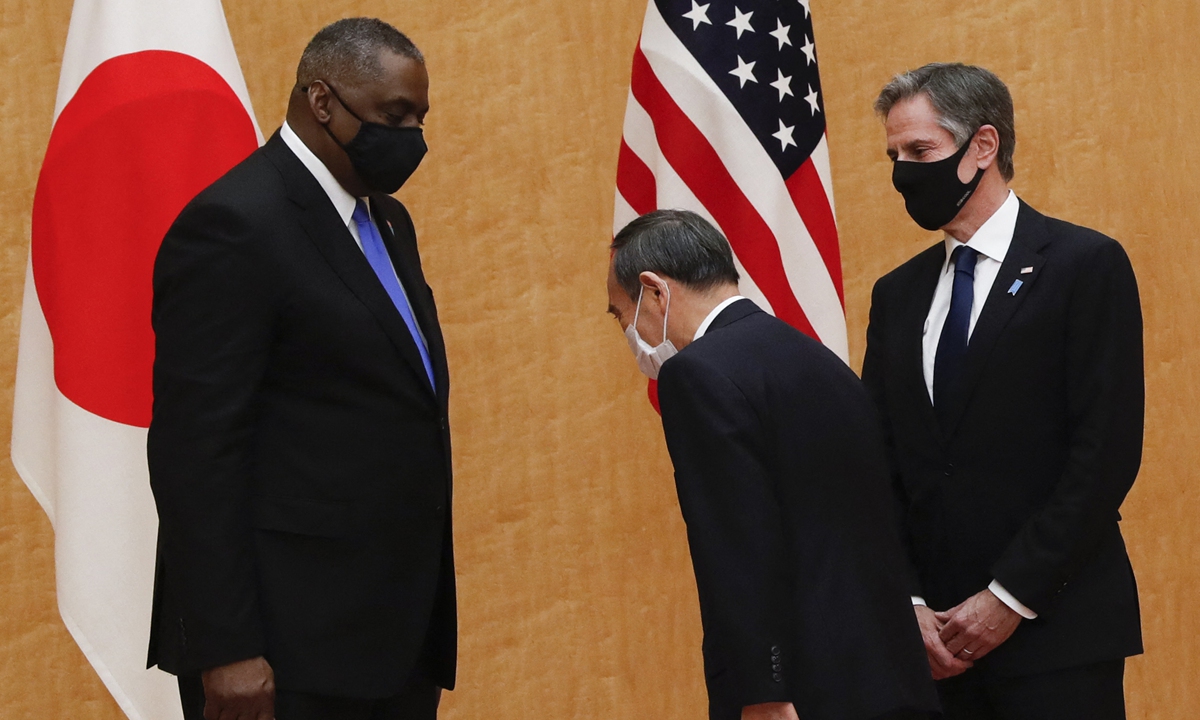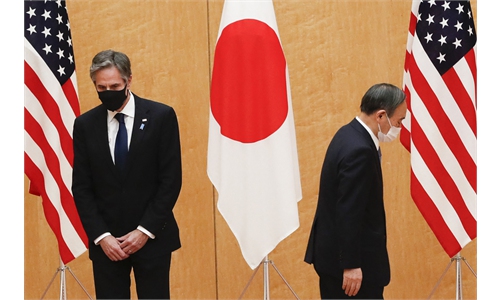
Japanese Prime Minister Yoshihide Suga greeted US Secretary of State Antony Blinken and US Defense Secretary Lloyd Austin. Photo: AFP
Japan and the US plan to affirm the significance of stability in the Taiwan Straits when Japanese Prime Minister Yoshihide Suga visits Washington in April for a summit with US President Joe Biden, according to Nikkei. The report said that the two sides are in discussions to include the passage on the island of Taiwan in a joint statement to be released after the summit.With China's rise, peaceful albeit, the US feels urgent to contain China's growth to maintain its regional and global hegemony. Yet the international community has witnessed the US' decline. The US may be aware that it can hardly curb China's advance on its own, said Wang Guangtao, an associate research fellow at the Center for Japanese Studies of Fudan University. Thus, Washington wants to gang up against China with its allies, including Japan, one of its pivotal allies in the region. It is anticipated that the US has piled considerable pressure on Japan.
The US-Japan military alliance has been on an unequal footing - the US has pledged to defend Japan, while Japan has coordinated and bolstered US strategies. Since the previous Shinzo Abe administration, Tokyo had proactively collaborated with Washington's Indo-Pacific Strategy. The Suga administration's cooperation with the US' global and regional strategic deployment is consistent with Japan's long-term diplomatic practices.
This is not the sole case in which Japan publicly and explicitly expressed its voices on the Taiwan question with the US in recent weeks. Japanese government sources said on March 20 that Japanese and US defense chiefs agreed in their meeting in Tokyo on March 16 to closely cooperate in the event of a military clash between the Chinese mainland and the island of Taiwan, according to Kyodo News.
Amid the visit of US Defense Secretary Lloyd Austin to Tokyo on March 16, his Japanese counterpart Nobuo Kishi noted that the Chinese mainland's defense spending has now grown 16 times Taiwan's. A joint statement of the recent US-Japan "2+2" meeting said the two countries both "underscored the importance of peace and stability in the Taiwan Strait."
However, as the Kyodo News reported, Tokyo's policy on cross-Taiwan Straits relations is to encourage dialogue for a peaceful solution to the tensions. It is rare to see Japan express its notion on the Taiwan question with the US at such a frequent rate in less than one month. Why?
Japan, as China's neighbor, labeled China as its main security threat in the annual defense review in 2019. From Japan's perspective, to ease its insecure sentiment, it is necessary to consolidate its defense forces and pursue a closer alliance with the US. Hyping the cross-Straits tensions has become its leverage to strengthen its defense capabilities. Furthermore, as Suga's scheduled visit to the US is approaching, leaning to the US in terms of the Taiwan question, the most important and sensitive issue between China and the US, will help Japan seek more security guarantees from the US.
Additionally, Suga's term as the Liberal Democratic Party president, and as the prime minister, is due to end in September. To win the next election, the Suga administration needs to meet domestic expectations. Its tough stance on China by playing the "Taiwan card" is also to accumulate political capital.
Japan's recent noises on the Taiwan question will definitely hit its relations with China. If the passage on Taiwan is included in the joint statement after the summit between Suga and Biden, the hit will be grave. If Japan makes any substantive move that impairs China's national interests on the Taiwan question, China will take countermeasures against it. Japan's loss will sharply outweigh its gain if it ties itself on the US' anti-China chariot and sows discord across the Taiwan Straits.

